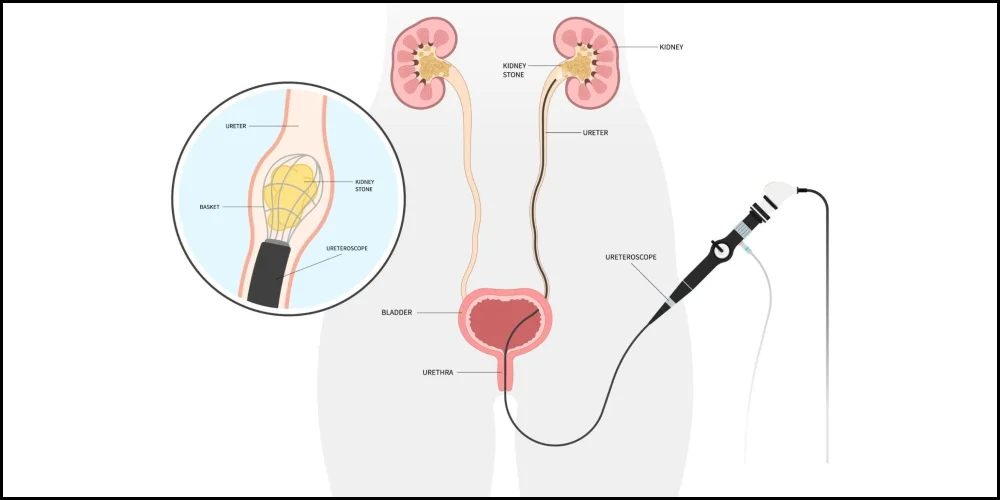Ureteroscopy Surgery
Advanced Techniques for Ureteral Diagnosis and Management
Ureteroscopy surgery is a specific procedure that is used to look at and treat ailments that affect the ureters, which are the tubes that transport water from your kidneys and into your bladder. The procedure is minimally-invasive and uses an ureteroscope which is a thin flexible instrument that includes cameras, which allow you to see and resolve issues in the urinary tract. Our highly skilled urologists utilize state-of-the-art technologies to conduct ureteroscopy at accuracy, which ensures a precise diagnosis and efficient treatment for different ureteral issues.

What is Ureteroscopy Surgery?
Ureteroscopy surgery involves the introduction of a ureteroscope via the bladder and urethra into the ureter. The ureteroscope comes with an image camera and light source, which allows the surgeon to see the inside of the ureter. The procedure can be utilized to treat and diagnose conditions like ureteral stones tumors, strictures, and various other irregularities. Ureteroscopy is performed using either a rigid or flexible Ureteroscopy, depending on the particular needs for the individual patient.
Who Performs Your Surgery?
The ureteroscopy procedure is carried out by a group comprised of highly trained urologists who specialize in ureteral disorders and minimally-invasive methods. Our surgeons are specialists in the use of advanced ureteroscopy techniques to give exact diagnostics and treatments. They are joined by a committed team of staff members to provide a complete and pleasant experience during the entire surgical procedure.
Types of Ureteroscopy Surgery
- Flexible Ureteroscopy :- Uses a flexible narrow ureteroscope which can travel across the entire length of urinary tract. It is typically employed to treat and diagnose problems within the lower ureter and kidney.
- Rigid Ureteroscopy :- It is a straight, rigid ureteroscope, which is commonly employed to examine and treat issues that affect the upper part of the ureter. It offers a sturdy base for precise treatments.
Indications for Ureteroscopy Surgery
- Ureteral stones :- to locate, break up and then remove stones that cause discomfort or obstruction.
- Ureteral Strictures :- For assessing and treating obstructions or narrowings in the ureter. Ureteral Tumors : For the purpose of identifying, diagnosing, as well as eventually remove abnormal growths or tumors.
- Infrequent Urinary Tract Infections :- To investigate underlying causes and offer specific treatment.
Diagnosis Leading to Ureteroscopy
The diagnosis usually involves an in-depth examination of the symptoms such as medical history, symptoms, and tests that are preliminary, such as images studies (e.g., CT scan or ultrasound). Ureteroscopy can give a clear view of the ureters. This allows for precise diagnosis and treatment planning.
Treatment Process
Ureteroscopy is generally done in outpatient settings under general or local anesthesia, based on the extent of the procedure’s complexity as well as the patient’s satisfaction. It involves inserting a catheter through the urethra as well as bladder and into the ureter in order to assess and treat the issue. To remove stones, instruments can be used to break up and remove stones. The procedure usually lasts between 30 and 60 minutes.
Care and Recovery After Surgery
The healing process following a ureteroscopy procedure is generally fast, with the majority of patients returning to normal activities in just a few days. After the procedure, you should take care to manage any discomfort, taking plenty of fluids, and adhering to the instructions given by your physician. The importance of follow-up appointments is checking your recovery and addressing any other treatment needs.
Advantages of Choosing Our Surgery Services
Advanced Technology
We use the latest ureteroscopy equipment to ensure accurate diagnosis and effective treatment with minimal invasiveness.
Expert Care Team
Our specialized urologists and support staff provide expert care, focusing on patient comfort, precision, and comprehensive support.
Efficient and Effective Treatment
Our approach emphasizes quick recovery and effective management of ureteral conditions, helping you return to normal life promptly.
What Our Patients Say
Read about our patients positive experiences and how Chirayu Super Speciality Hospital has positively impacted their health and well-being.


The care and quick recovery after my ureteroscopy surgery were outstanding. Chirayu team provided excellent support and results.


My recovery from ureteroscopy was quick, and the results were positive. The Chirayu team expertise made a significant difference.


I experienced exceptional care and precision during my ureteroscopy surgery. The Chirayu team made the process comfortable and successful.


The ureteroscopy at Chirayu was highly effective in treating my ureteral stones. The procedure and recovery were smooth, thanks to the excellent care.
Meet Our Medical Specialists
"Our skilled urologists specialize in ureteroscopy, offering advanced diagnostic and treatment solutions for comprehensive care of ureteral conditions. "
Frequently Asked Questions
Here, we provide answers to some of the most commonly asked questions to help you better understand about our surgery services. If you have any additional questions, please do not hesitate to contact us.
Candidates include individuals with ureteral stones, strictures, tumors, or recurrent urinary tract infections that require direct intervention.
Types include flexible ureteroscopy for lower ureter and kidney issues, and rigid ureteroscopy for upper ureter conditions.
Ureteroscopy surgery involves using a ureteroscope to examine and treat conditions affecting the ureters, such as stones or tumors.
Benefits include accurate diagnosis, targeted treatment for ureteral conditions, minimal invasiveness, and quick recovery.
Risks include mild discomfort, potential infection, and, rarely, injury to the ureter or bladder.



